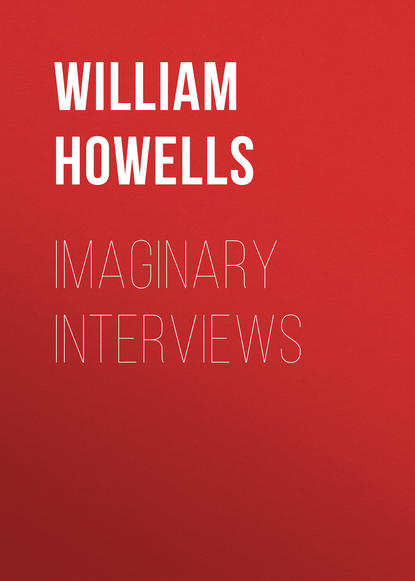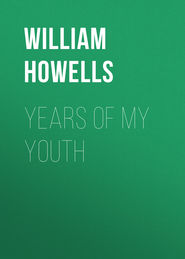По всем вопросам обращайтесь на: info@litportal.ru
(©) 2003-2024.
✖
Imaginary Interviews
Настройки чтения
Размер шрифта
Высота строк
Поля
XV
COMPARATIVE LUXURIES OF TRAVEL
On a night well toward its noon, many years ago, a friend of the Easy Chair (so close as to be at the same time its worst enemy) was walking wearily up and down in the station at Portland, Maine, and wondering if the time for his train to start would ever come, and, if the time did come, whether his train would really take advantage of that opportunity to leave Portland. It was, of course, a night train, and of course he had engaged a lower berth in the sleeping-car; there are certain things that come by nature with the comfortable classes to which the friend of the Easy Chair belonged. He would no more have thought of travelling in one of the empty day coaches side-tracked in the station than he would have thought of going by stage, as he could remember doing in his boyhood. He stopped beside the cars and considered their potential passengers with amaze and compassion; he laughed at the notion of his being himself one of them; and, when he turned his back on them, he was arrested by the sight of an elderly pair looking from the vantage of the platform into the interior of a lighted Pullman parlor-car which, for reasons of its own, was waiting in luminous detachment apart from the day coaches. There was something engaging in the gentle humility of the elderly pair who peered into the long, brilliant saloon with an effect not so much of ignorance as of inexperience. They were apparently not so rustic as they were what another friend of the Easy Chair calls villaginous; and they seemed not of the commonest uninformed villaginosity, but of general intelligence such as comes of reading and thinking of many modern things which one has never seen. As the eavesdropper presently made out from a colloquy unrestrained by consciousness of him, they had never seen a parlor-car before, except perhaps as it flashed by their meek little home depot with the rest of some express train that never stopped there.
"It is splendid, John," the woman said, holding by the man's arm while she leaned forward to the window which she tiptoed to reach with her eager eyes.
"I guess it's all of that," the man consented, sadly.
"I presume we sha'n't ever go in one," she suggested.
"Not likely," he owned, in the same discouraged tone.
They were both silent for a time. Then the woman said, with a deep, hopeless aspiration, "Dear! I wish I could see inside one, once!"
The man said nothing, and if he shared her bold ambition he made no sign.
The eavesdropper faltered near their kind backs, wishing for something more from them which should give their souls away, but they remained silently standing there, and he did not somehow feel authorized to make them reflect that, if the car was lighted up, it must be open, and that the friendly porter somewhere within would not mind letting them look through it under his eye. Perhaps they did reflect, and the woman was trying to embolden the man to the hardy venture. In the end they did not attempt it, but they turned away with another sigh from the woman which found its echo in the eavesdropper's heart. Doubtless if they had penetrated that splendid interior without having paid for seats, it would, in some fine, mystical sort, have pauperized them; it would have corrupted them; they would have wished after that always to travel in such cars, when clearly they could not afford it; very possibly it might have led to their moral if not financial ruin. So he tried to still his bosom's ache, but he could never quite forget that gentle pair with their unrequited longing, and the other day they came almost the first thing into his mind when he read that a great German steamship company had some thoughts of putting on a train of Pullman cars from the port of arrival to the mercantile metropolis which was the real end of their ships' voyages. He thought, whimsically, perversely, how little difference it would make to that pair, how little to those measureless most whose journeys shall end in heaven, where Pullman passengers, or even passengers by the ordinary European first-class cars, may be only too glad to meet them. He gave a looser rein to his thoughts and considered how very little the ordinary necessities of life, such as Pullman cars and taxicabs and electric radiators and non-storage chickens and unsalted butter concern the great mass of the saints, who would find them the rarest luxuries, and could hardly be imagined coveting them; and then from this wild revery he fell to asking himself whether a Pullman train would be such a great advance or advantage over the old-fashioned European first-class carriages in which he had been so long content to travel with the native nobility. Self-brought to book on this point, he had to own that he had once had moments of thinking in a German second-class car that he would not change to an American Pullman if he could for even less than a third more money. He recalled a pleasant run from Crewe to Edinburgh in a third-class English car, when he never once thought of a Pullman car except to think it was no better. To be sure, this was after two-thirds of his third-class fellow-passengers had got out, and he was left to the sole enjoyment of two-thirds of the seats. It is the luxury of space which your more money buys you in England, where no one much lower than a duke or a prime minister now goes first class for a long haul. For short hauls it is different, and on the Continent it is altogether different. There you are often uncomfortably crowded in the first-class carriages, and doubtless would be in a Pullman if there were any, so that if you are wise, or only well informed, you will give the guard a shilling to telegraph before leaving London and get you a number on the Rapide from Calais to Paris.
It is astonishing how quickly knowledge of any such advisable precaution spreads among even such arrogantly stupid people as first-class passengers ordinarily are. By the time a certain train had started for Dover with that friend of the Easy Chair's already mentioned, every soul in his first-class compartment had telegraphed ahead, and when they arrived in Calais the earliest Englishman who got past the customs ran ahead and filled the racks of the carriage with his hand-baggage, so that the latest Frenchman was obliged to jump up and down and scream, and perhaps swear in his strange tongue, before he could find room for his valise, and then calm down and show himself the sweetest and civilest of men, and especially the obedient humble servant of the Englishman who had now made a merit of making way for his bag.
At this point the fable teaches that money will not buy everything in European travel, though some Americans imagine it will. It will not, for instance, buy comfort or decency, though it will secure privacy in a French sleeper between Paris and Marseilles either way. For an augmentation of forty-five francs, or nine dollars, on the price of a first-class ticket, it will buy you a berth in a small pen which you must share with another animal, and be tossed hither and yon, night long, as in the berth of a Bermuda steamer. Second-class passengers in France or Italy cannot buy a berth in a sleeper for any money, and they may go hang or stand, for all the International Sleeping-Car Company cares; and this suggests the question whether in our own free and equal land the passengers in the ordinary day coaches are ever invited, by the first call or the last, to share the hospitalities of our dining-cars; or are these restricted to the proud stomachs of the Pullman passengers?
No, no; the privacy of a French sleeping-car is all very well, but for decency give our friend a good, old-fashioned Pullman sleeper at a third the money, with its curtains swaying with the motion of the car and muting the long-drawn, loud-drawn breathing of the serried sleepers behind them. To be sure, in the morning, when stooping backs begin to round the curtains out, and half-shod feet to thrust into the narrow gangway between them, the effect is of a familiarity, an intimacy; but so much trust, so much brotherly kindness goes with it all that you could not call it indecency, though certainly you could not claim it privacy. It only proves, as that friend of ours was saying, that money cannot buy everything, and that, if you expect the Pullman parlor-cars to be an improvement on the German first-class cars, you will be disappointed, probably. First-class cars vary much all over Europe; even second-class cars do. In Austria they are not nearly so good as in Germany, and in Italy – poor, dear Italy! – they are worse still. That is because, the enemies of socialism say, the roads are state roads, or because, the friends of socialism say, the expropriated companies have dumped their worn-out rolling-stock on the commonwealth, which must bear the shame of it with the stranger. Between these clashing claims we will not put our blade. All we say is that Italian railroad travel is as bad as heart could wish – the heart that loves Italy and holds dear the memory of the days when there were few railroads, if any, there, and one still went by diligence or vettura. The only absolutely good railroad travel is in England, where the corridor car imagined from the Pullman has realized the most exacting ideal of the traveller of any class. In the matter of dining-cars we have stood still (having attained perfection at a bound), while the English diner has shot ahead in simplicity and quality of refection. With us a dollar buys more dinner than you wish or like; with them three shillings pay for an elegant sufficiency, and a tip of sixpence purchases an explicit gratitude from the waiter which a quarter is often helpless to win from his dark antitype with us. The lunch served on the steamer train from London to Liverpool leaves the swollen, mistimed dinner on the Boston express —
"But what about that 5 P.M. breakfast which you got, no longer ago than last September, on the express between Salisbury and Exeter?" our friend exults to ask; and we condescend to answer with forced candor:
Yes, that was rather droll. No Englishman would dream of ordering afternoon tea consisting of chops, boiled potatoes, and a pot of souchong, and, if we chose to do so, we took a serious chance. But starvation will drive one to anything; we had had nothing to eat since leaving Salisbury three hours before, and in the English air this is truly famine. Besides, the amiable agent who came to our compartment for our order pledged his word that those potatoes should be ready in twenty minutes; and so they were, and so were the chops, and so, of course, was the tea. What he had failed to specify was that the dining-car had been left, by divers defections at the junctions passed, the last car in our train, and that it was now straining at its leash in wild leaps and bounds. One reached it by passing through more corridor cars than there are Pullmans and day coaches in a west-bound Lake Shore train, and when one arrived one reeled and flounced into one's seat by such athletics as one uses in a Bermuda steamer (or did use in the old fifteen-hundred-ton kind) crossing the Gulf Stream. When once comparatively secure in one's chair, the combat with the lunch began. Mrs. Siddons would have been at home there, for there was nothing for it but to stab the potatoes, and all one's cunning of fence was needed to hold one's own with the chops. But how delicious they were! How the first mealed and the last melted in the mouth; and the tea, when once poured from the dizzy height at which the pot had to be held, and the wild whirl in which the cup had to be caught to the lips, how it cheered without inebriating, and how the spirit rose to meet it! The waiter, dancing and swaying like any ship's steward, served the stray Americans with as much respectful gravity as if they had been county-family English and he had been for generations in their service. He did not deprecate the capers of the car, but only casually owned that, when it happened to be the last in the train, it did pitch about a bit, sir.
No, England is the only country where you can get the whole worth of your money in railroad travel, and the well-to-do sinner can enjoy the comfort which must be his advance recompense in this world for the happiness he cannot warrantably count upon in the next. That steamer train of Pullmans in Germany will never contest the palm with the English corridor train; nor will our palatial, porterless depots vie with the simplest of these English wayside stations, where the soft endearments of the railway servants penetrate to the very interior of the arriving stranger's compartment and relieve him of all anxiety for his hand-baggage. Then the cloak-room, that refuge of temporary sojourn, where his baggage remains in the porter's charge till it is put back into the train, who will contend that our parcels' windows, with their high counters fencing the depositor from the grim youths standing like receiving and paying tellers within, compare with the English cloak-room? Its very name descends from the balls and assemblies of the past, and graces the public enjoyment of its convenience with something of the courtesy and dignity of the exclusive pleasures of the upper classes; it brings to one sense a vision of white shoulders bent over trim maids slippering slim feet, and to another the faint, proud odors of flowers that withered a hundred years ago.
But what vain concession is this to the outworn ideals of a state and a condition justly superseded! How far we have got from that gentle pair with whom we began peering into the parlor-car in Portland, Maine! To such as they it will matter little whether Pullman cars are or are not put on that steamer train in North Germany. A great danger is that the vast horde of Americans who travel will forget the immeasurable majority who remain at home, and will lose in their sophistication the heaven-glimpsing American point of view. It is very precious, that point of view, and the foreigner who wins it is a happier man than the native who purse-proudly puts it away. When we part with the daily habit of trolleys and begin to think in cabs and taxicabs; when we pass the line of honest day coaches and buy a seat in the parlor-car; when we turn from pie, or baked beans, and coffee at the refreshment-counter and keep our hunger for the table d'hôte of the dining-car; when we buy a room in the steamboat in disdain of the berth that comes with our ticket; when we refuse to be one of four or even two in the cabin of the simpler steamers and will not go abroad on any vessel of less than twenty or thirty thousand tons, with small, separate tables and tuxedos in the saloon; when we forsake the clothing-store with its democratic misfit for all figures and order our suits in London, then we begin to barter away our birthright of republican simplicity, and there is soon nothing for us but a coronet by marriage in the family or a quarter-section of public land in northwestern Canada.
There has been altogether too much talk (some of it, we contritely own, has been ours) of the comparative comforts and discomforts of life for the better-to-do in Europe and America. In the demand for Pullman trains between our port of arrival and the end of our journey when we go to the Continent for a much-needed rest, we are apt to forget the fellow-citizens whom we saw across the impassable barrier dividing our first class from them on the steamer, and who will find the second-class German cars quite good enough for them, and better than our day coaches at home. If we cannot remember these, then let us remember those for whom Pullmans are not good enough and who spurn the dust of our summer ways in their automobiles, and leave the parlor-cars to our lower-class vulgarity. Such people take their automobiles to Europe with them, and would not use that possible Pullman train if they found it waiting for them at the port of arrival in Germany. What is the use? It will soon not be an affair of automobiles, but of aeroplanes, at the ports of European arrival, and a Pullman train will look sadly strange and old to the debarking passengers. No one will want to take it, as no one would now want to take a bicycle, or even a "bicycle built for two." These things are all comparative; there is nothing positive, nothing ultimate in the luxuries, the splendors of life. Soon the last word in them takes on a vulgarity of accent; and Distinction turns from them "with sick and scornful looks averse," and listens for the
"airy tongues that syllable men's names
On sands and shores and desert wildernesses."
Simplicity, at the furthest possible remove from all complexity, will be the next word – the word that follows the last, the woman's word.
XVI
QUALITIES WITHOUT DEFECTS
They had got to that point in their walk and talk where the talk might be best carried forward by arresting the walk; and they sat down on a bench of the Ramble in Central Park, and provisionally watched a man feeding a squirrel with peanuts. The squirrel had climbed up the leg of the man's trousers and over the promontory above, and the man was holding very still, flattered by the squirrel's confidence, and anxious not to frighten it away by any untoward movement; if the squirrel had been a child bestowing its first intelligent favors upon him the man could not have been prouder. He was an old fellow, one of many who pamper the corrupt rodents of the Park, and reduce them from their native independence to something like the condition of those pauper wards of the nation on our Indian Reservations, to whom a blurred image of the chase offers itself at stated intervals in the slaughter of the Government's dole of beef-cattle.
The friend to whom this imperfect parallel occurred recalled his thoughts from it and said, with single reference to the man and the squirrel: "I suppose that's an expression of the sort of thing we've been talking about. Kindness to animals is an impulse, isn't it, of the 'natural piety' embracing the fatherhood of God and the brotherhood of man?"
"I don't think it's quite so modern as that formulation," the other friend questioned. "I was thinking it was very eighteenth-century; part of the universal humanitarian movement of the time when the master began to ask himself whether the slave was not also a man and a brother, and the philanthropist visited the frightful prisons of the day and remembered those in bonds as bound with them."
"Yes, you may say that," the first allowed. "But benevolence toward dumb creatures originated very much further back than the eighteenth century. There was St. Francis of Assisi, you know, who preached to the birds, didn't he? and Walter von der Vogelweide, who pensioned them. And several animals – cats, crocodiles, cows, and the like – enjoyed a good deal of consideration among the Egyptians. The serpent used to have a pretty good time as a popular religion. And what about the Stoics? They were rather kind to animals, weren't they? Why should Pliny's Doves have come down to us in mosaic if he cultivated them solely for the sake of broiled squabs? It's true that the modern Roman, before the extension of the S.P.C.A. to his city, used his horse cruelly upon the perfectly unquestionable ground that the poor beast was not a Christian."
"I don't remember about the Stoics exactly," the second friend mused aloud; and the first let this go, though they both understood that very likely he not only did not remember, but had never known. "They had so many virtues that they must have been kind to brutes, but I taste something more Cowperian, more Wordsworthian, than Marcus-Aurelian in our own kindness. These poets taught me, so far as I could learn, not to
'enter on my list of friends the man
Who needlessly sets foot upon a worm,'
and
'Never to mix my pleasure or my pride
With sorrow of the meanest thing that breathes.'"
"Yes, but I don't like giving up the Stoics; we may have to come back to their ground if things keep on going the way they have gone for the last generation. The Stoics had a high ideal of duty; it's hard to see that the Christian ideal is higher, though they taught themselves to be proudly good, and we (if we may still say we when we say Christians) are always trying to teach ourselves to be humbly good."
"What do you mean," the second of the friends demanded, "by coming back to their ground?"
"Why," the first responded, picking up a twig that opportunely dropped at his feet, and getting out his knife to whittle it, "I suppose they were the first agnostics, and we who don't so much deny the Deity as ignore Him – "
"I see," the second answered, sadly. "But aren't you throwing up the sponge for faith rather prematurely? The power of believing has a tremendous vitality. I heard a Catholic once say to a Protestant friend, 'You know the Church has outlived schisms much older than yours.' And inside of Protestantism as well as Catholicism there is a tremendous power of revival. We have seen it often. After an age of unbelief an age of belief is rather certain to follow."
"Well, well, I'm willing. I'm no more agnostic than you are. I should be glad of an age of faith for the rest to my soul, if for no other reason. I was harking back to the Stoics not only because they were good to animals, if they were good, but because they seemed to have the same barren devotion to duty which has survived my faith as well as my creed. But why, if I neither expect happiness nor dread misery, should I still care to do my duty? And I certainly always do."
"What, always?"
"Well, nearly always."
The friends laughed together, and the first said, "What a pity the Gilbertian humor has gone out so; you can't adapt it to a daily need any longer without the risk of not being followed."
The other sighed. "Nearly everything goes out, except duty. If that went out, I don't think I should have much pleasure in life."
"No, you would be dead, without the hope of resurrection. If there is anything comes direct from the Creative Force, from
'La somma sapienza e il primo amore,'
it is the sense of duty, 'the moral law within us,' which Kant divined as unmistakably delivered from God to man. I use the old terminology."
"Don't apologize. It still serves our turn; I don't know that anything else serves it yet. And you make me think of what dear old M.D. C – told me shortly after his wife died. He had wished, when they both owned that the end was near, to suggest some comfort in the hope of another life, to clutch at that straw to save his drowning soul; but she stopped him. She said, 'There is nothing but duty, the duty we have wished to do and tried to do.'"
The friends were silent in the pathos of the fact, and then the first said, "I suppose we all wish to do our duty, even when we don't try or don't try hard enough."
The other conjectured, "Perhaps, after all, it's a question of strength; wickedness is weakness."
"That formula won't always serve; still, it will serve in a good many cases; possibly most. It won't do to preach it, though."
"No, we must cultivate strength of character. I wonder how?"
"Well, your Stoics – "











